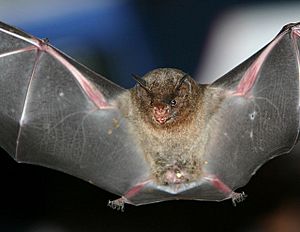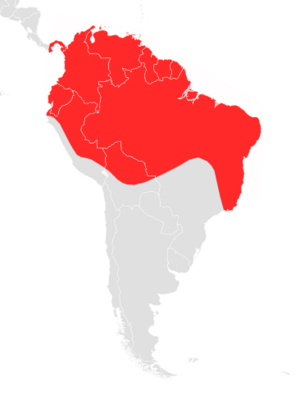Silky short-tailed bat facts for kids
Quick facts for kids Silky short-tailed bat |
|
|---|---|
 |
|
| Conservation status | |
| Scientific classification | |
| Genus: |
Carollia
|
| Species: |
brevicauda
|
 |
|
| Silky short-tailed bat range | |
The silky short-tailed bat (Carollia brevicauda) is a small, furry bat species. It gets its name from its soft fur and short tail. These bats live in many countries across Central and South America. You can find them in places like Bolivia, Brazil, Colombia, Ecuador, French Guiana, Guyana, Panama, Peru, Suriname, Mexico, and Venezuela.
Contents
What Do Silky Short-Tailed Bats Eat?
These bats love to eat fruit! Their main diet is made up of different kinds of fruits. They are especially fond of small fruits and those from the piper plant family.
More Than Just Fruit
Sometimes, when fruits are harder to find, these clever bats will also eat other things. They might look for insects on leaves. During the dry season, they can also drink nectar from flowers. This helps them get enough energy when their favorite fruits are scarce.
Why Are These Bats Important?
Silky short-tailed bats play a super important role in their environment. When they eat fruit, they also swallow the seeds. Later, when they fly and poop, they drop these seeds in new places. This helps new plants grow!
Nature's Gardeners
Because they spread seeds, these bats are like little gardeners for the forest. They help plants and trees grow in new areas. This makes the forest healthier and more diverse. They are especially important for spreading piper plants.
Where Do They Live?
These bats live in warm, tropical areas. They are found in rainforests and other wooded areas. Their wide range across many countries shows how adaptable they are. They need places with plenty of fruit trees to find their food.
Conservation Status
The silky short-tailed bat is currently listed as "Least Concern" (LC) by the IUCN. This means that, for now, there are many of these bats in the wild. They are not considered to be in danger of disappearing. However, it's always important to protect their habitats.
See also
 In Spanish: Carollia brevicauda para niños
In Spanish: Carollia brevicauda para niños


